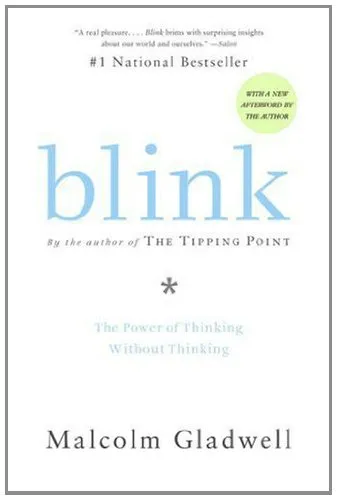Blink: The Power of Thinking Without Thinking
4.5
Reviews from our users

You Can Ask your questions from this book's AI after Login
Each download or ask from book AI costs 2 points. To earn more free points, please visit the Points Guide Page and complete some valuable actions.Introduction to 'Blink: The Power of Thinking Without Thinking'
Welcome to an exploration of Malcolm Gladwell's 'Blink: The Power of Thinking Without Thinking'—a riveting examination of the seemingly magical process our brains undergo when making split-second decisions or developing rapid judgments.
Detailed Summary of the Book
Published in 2005, 'Blink' delves into the fascinating topic of rapid cognition—a term that encapsulates our brain's ability to analyze situations quickly and effectively, often within the blink of an eye. Gladwell presents a compelling narrative that challenges the conventional belief that longer thought processes equate to more accurate decisions. Instead, he argues that, under certain circumstances, brief, intuitive flashes of insight can lead to better outcomes than long deliberative processes.
The book is structured around an array of gripping stories that exemplify its core premise. From art experts who can differentiate a fake from an original in seconds to firefighters making split-second decisions on-site, 'Blink' demonstrates that intuitive thinking can profoundly influence personal and professional outcomes.
Gladwell also introduces the concept of "thin-slicing," the ability to find patterns in events based only on "thin slices," or narrow windows of experience. He illustrates how people can often infer deeper truths in mere moments of observation, and how this ability coexists with occasionally misleading biases—prompting the reader to consider both the power and the pitfalls of their snap judgments.
Key Takeaways
- Perfect decisions are not solely a result of long, carefully considered processes. Quick decisions can often be as or more accurate.
- Expertise refines the capacity for rapid cognition; this intuitive power grows stronger with experience.
- Our instincts are highly sensitive to contextual cues and can often read them accurately, but they are not infallible.
- Understanding subconscious biases is crucial since they can disproportionately influence our immediate judgments.
- Effective decision-making often involves balancing analytical thinking with our natural intuitive skills.
Famous Quotes from the Book
"We have, as human beings, a storytelling problem. We like to tell stories about past events and talk about human beings and what they should have done, as if that matters. But it doesn't. The things that happen to us in life are not the critical events: it's the moments in between that we almost miss. It's in those moments that I believe we truly live."
"The key to good decision making is not knowledge. It is understanding. We are swimming in the former. We are desperately lacking in the latter."
Why This Book Matters
'Blink' has sparked significant thought and dialogue regarding how we perceive the world and make decisions, impacting disciplines ranging from psychology to business, and beyond. At its core, the book provides a framework to critically assess both our instincts and biases—a blend crucial for refining decision-making skills in both personal and professional contexts.
Gladwell's insights encourage readers to trust their gut, but with an informed skepticism that keeps unchecked biases at bay. By learning to harness the power of thinking without thinking consciously, individuals and organizations can potentially improve decision outcomes.
Overall, 'Blink' is pivotal because it equips readers with a deeper understanding of the mind's nuanced workings, shining a light on the often-overlooked value of intuitive thinking and challenging widely-held assumptions about rationality and reflection.
Free Direct Download
You Can Download this book after Login
Accessing books through legal platforms and public libraries not only supports the rights of authors and publishers but also contributes to the sustainability of reading culture. Before downloading, please take a moment to consider these options.
Find this book on other platforms:
WorldCat helps you find books in libraries worldwide.
See ratings, reviews, and discussions on Goodreads.
Find and buy rare or used books on AbeBooks.
1331
بازدید4.5
امتیاز50
نظر98%
رضایتReviews:
4.5
Based on 0 users review
"کیفیت چاپ عالی بود، خیلی راضیام"
Questions & Answers
Ask questions about this book or help others by answering
No questions yet. Be the first to ask!


